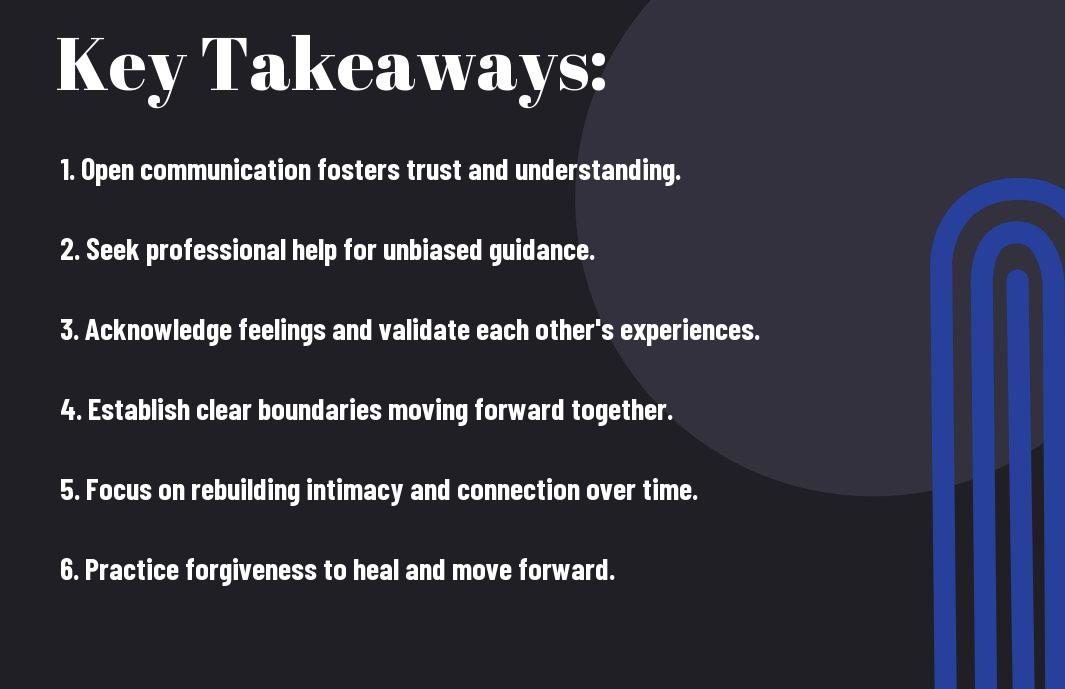You can transform your relationship by effectively navigating the aftermath of infidelity. Although betrayal can leave deep scars, it also presents an opportunity for growth and renewed intimacy. By fostering open communication, establishing trust, and seeking professional help, you can rebuild a healthier bond with your partner. This process requires commitment from both sides, but with determination, you can not only overcome past challenges but also create a stronger, more resilient relationship moving forward.

Key Takeaways:
- Open communication is crucial; both partners should share their feelings, expectations, and concerns honestly.
- Establish trust by being transparent about actions and intentions moving forward.
- Seek professional help, such as couples therapy, to guide the healing process and provide unbiased support.
- Take responsibility for actions; acknowledge the reasons behind the infidelity and work on personal growth.
- Set new boundaries and guidelines to help rebuild the foundation of the relationship.
- Practice forgiveness; both partners must work towards letting go of past grievances to move forward positively.
- Focus on rebuilding intimacy gradually; engage in activities that strengthen the emotional and physical connection.

Understanding Infidelity
While infidelity can be a devastating blow to any relationship, it often reveals deeper issues that went unaddressed. Understanding the complexities of infidelity is key to not only grasping its impact on your partnership but also in finding pathways to healing and growth. By delving into the motivations and emotional experiences behind infidelity, you can start to set a foundation for rebuilding trust and intimacy.
The Psychological Impact
One of the most profound effects of infidelity is the emotional turmoil it stirs within both partners. The betrayed individual often experiences feelings of betrayal, anger, and self-doubt, while the offending partner may face guilt, shame, and fear of losing their relationship. Both partners need to navigate these intense feelings to begin the healing process.
Common Causes of Infidelity
Psychological factors can play a significant role in why infidelity occurs. Often, individuals who cheat are seeking to fulfill unmet needs or escapism from stressors in their everyday life. Factors like emotional disconnection, lack of intimacy, and unresolved conflicts within the primary relationship can also push individuals towards infidelity. Understanding these causes is important for addressing the root issues underlying infidelity.
And, it’s important to note that infidelity can stem from a variety of sources. Sometimes, individual dissatisfaction in personal or relational domains can create an emotional void, leading one to seek affirmation outside of the relationship. Additionally, factors like opportunity, peer influences, and a sense of adventure or thrill can also drive people to cheat. By identifying these underlying issues, you can begin exploring solutions that address both your personal needs and the dynamics of your relationship.
Acknowledging the Betrayal
The first step in overcoming infidelity is acknowledging the betrayal. You must confront the painful truth of the situation to move forward. As you navigate this process, consider seeking guidance from resources like Healing from Infidelity: How to Rekindle Intimacy and … that can support you and your partner in rebuilding your relationship.
Emotions Involved
After an affair, a whirlwind of emotions floods your relationship—hurt, anger, betrayal, and confusion. You may feel these emotions intensely, and it’s imperative to recognize and validate them. Acknowledging these feelings in you and your partner is fundamental to the healing process.
The Importance of Open Communication
Acknowledging the betrayal serves as the foundation for open communication between you and your partner. This dialogue should feel safe and supportive, allowing both parties to express their feelings without fear of escalation. By focusing on honesty and transparency, you create an environment where misunderstandings can be resolved, leading to a deeper connection and understanding. It’s vital to discuss not only the events that transpired but also the emotions associated with them. When both of you engage in this open dialogue, you’ll foster healing and pave the way for rebuilding trust.
Rebuilding Trust
Unlike the initial phases of your relationship, rebuilding trust after infidelity requires a profound commitment from both partners. It necessitates an open dialogue, where feelings, fears, and expectations are expressed honestly. You must understand that this process takes time and patience, but by demonstrating reliability and consistency, you can create a foundation for renewed connection and intimacy.
Establishing Honesty
Between you and your partner, honesty becomes the cornerstone of healing. This involves being transparent about your feelings, fears, and ongoing challenges. Expressing your thoughts openly fosters an environment where both partners feel secure and valued, encouraging deeper emotional connections.
Setting Boundaries
Rebuilding your relationship includes defining expectations and limits to prevent future hurts. You and your partner should engage in discussions about your comfort levels and what has changed after the infidelity. This includes outlining how to handle interactions with others and setting rules that protect your relationship.
Due to the complexities of emotions following infidelity, setting boundaries is vital in ensuring both partners feel safe and understood. Discuss what behaviors are acceptable and which ones are not, establishing a clear framework for future interactions. This helps mitigate conflict and misunderstandings. Boundaries should be revisited regularly to adapt to your evolving relationship, fostering a sense of responsibility and mutual respect between you and your partner.
Seeking Professional Help
Keep in mind that overcoming infidelity can be a complex and emotional journey, often requiring the guidance of a professional. Seeking help from a qualified therapist can provide you and your partner with the tools needed to address underlying issues, rebuild trust, and facilitate open communication. Don’t hesitate to reach out for support, as this step can lead to healing and a deeper connection in your relationship.
Couples Therapy
One effective way to address the fallout of infidelity is through couples therapy. This type of therapy encourages both partners to openly communicate their feelings, fears, and needs, all while being guided by a trained therapist. By participating in this safe and structured environment, you can work together to understand the reasons behind the infidelity, rebuild trust, and create a healthier, more resilient relationship.
Individual Counseling
Between couple sessions, individual counseling can be instrumental in your healing process. This allows you to explore personal feelings and emotions, providing an opportunity to address any individual trauma or insecurities that may have contributed to the infidelity. It can also help you develop coping strategies and techniques to enhance your emotional well-being.
Couples often find that individual counseling helps them gain insight into their own behaviors and thought patterns that impact their relationship. With personalized attention, you can explore feelings of hurt, betrayal, or insecurity in a safe space, which can lead to personal growth. This self-discovery not only aids in your recovery but also fosters a more empathetic and understanding partnership, allowing you to approach shared challenges with new perspectives. Strengthening your emotional foundation can facilitate smoother communication and improve intimacy in your relationship.
Reconnecting and Strengthening the Bond
Once again, forging a strong connection after infidelity requires commitment and vulnerability from both partners. It’s important to create an environment of trust, allowing you to explore each other’s feelings and perspectives. As you work together to rebuild your relationship, focus on open communication and actively listening to one another, fostering a deeper understanding and mutual respect. This rebuilding process can lead to a more resilient and fulfilling partnership.
Shared Activities
Before plunging into the healing process, consider engaging in shared activities that reignite your passion for each other. Participating in fun, enjoyable experiences together can help create new memories, strengthen your bond, and help you find joy in each other’s company once again. Whether it’s taking a class, exploring new hobbies, or simply enjoying outdoor adventures, these activities can lay the groundwork for a more connected relationship.
Emotional Intimacy
Strengthening the emotional intimacy in your relationship is vital after a breach of trust. It’s not just about physical closeness, but also about sharing your thoughts, dreams, and vulnerabilities with one another. By fostering open dialogue about feelings and experiences, you can create a safe space for each partner to express themselves, leading to a deeper emotional connection.
Consequently, as you prioritize emotional intimacy, you’ll find that having honest conversations about your needs and desires creates a pathway to healing. Engage in active listening and validate each other’s feelings, which paves the way for increased support and understanding. You might also consider practicing vulnerability by sharing your deepest concerns and aspirations. This practice not only enhances your bond, but it can also pave the way towards a more resilient and trust-based relationship as you navigate challenges together.

Moving Forward Together
Despite the pain caused by infidelity, moving forward together is possible. It requires open communication, mutual respect, and a shared commitment to rebuild trust. Both partners must be willing to learn from the betrayal and prioritize the relationship’s healing process. Acknowledging the hurt and taking proactive steps towards a more honest, supportive partnership can create a pathway to a more resilient bond.
Setting Future Goals
By establishing clear, future goals, both partners can unite toward a common vision for your relationship. This can involve setting benchmarks for emotional intimacy, establishing new traditions, or addressing specific areas of concern. These goals should be realistic and attainable while aligning with your values and aspirations.
Creating a New Relationship Foundation
Together, you can create a new relationship foundation built on transparency, trust, and mutual support. This process involves both partners actively participating in discussions about feelings, needs, and fears. Commitment to consistent communication will foster intimacy, enabling you to address issues before they escalate. The focus should be on creating a healthy, empowering environment where both partners feel valued and heard.
Understanding that rebuilding your relationship requires dedication and patience is vital. This new foundation should prioritize transparency, with both partners actively sharing thoughts and emotions. Incorporate regular check-ins to discuss how you both feel within the relationship; this promotes openness and allows for the resolution of issues before they fester. Bear in mind, building trust takes time, but by fostering a culture of honesty and support, you can ensure that your partnership thrives and evolves beyond the past infidelity.
To wrap up
Conclusively, overcoming infidelity is challenging, but it is possible to rebuild and strengthen your relationship. Begin with open communication to address the underlying issues, practice forgiveness, and establish trust through consistent, loving actions. Set clear boundaries and goals for your relationship, focusing on mutual growth and understanding. Seek support from a counselor if needed, and take time to reconnect with each other. By committing to this journey together, you can transform your relationship into a deeper, more resilient partnership.
FAQ
Q: What are the first steps to take after discovering infidelity?
A: Upon discovering infidelity, it’s crucial to take some time for self-reflection. Consider your feelings and gather your thoughts before confronting your partner. Communicate openly but calmly about your feelings and concerns. It’s also beneficial to seek support from friends or a therapist to help you process the emotions involved.
Q: How can both partners rebuild trust after infidelity?
A: Rebuilding trust takes time and consistent effort from both partners. Open and honest communication is key; both individuals need to share their thoughts and feelings without judgment. Establishing boundaries and being transparent about actions can help. It may also be helpful to engage in couples therapy to work together under professional guidance.
Q: Is it possible to restore intimacy after infidelity?
A: Yes, restoring intimacy is possible but requires effort and patience. It starts with developing emotional safety and rebuilding trust. Partners should take time to discuss their needs and desires openly. Engaging in activities that foster connection, such as date nights or shared hobbies, can help rekindle intimacy in a safe environment.
Q: What role does forgiveness play in overcoming infidelity?
A: Forgiveness is a significant aspect of the healing process. However, it is crucial to understand that forgiveness does not mean forgetting or excusing the behavior. Instead, it is about letting go of the anger and hurt to move forward. Engaging in discussions with your partner about the future and what both of you need can help facilitate the forgiveness process.
Q: How can couples prevent infidelity from happening again in the future?
A: Preventing future infidelity involves both partners committing to the relationship and addressing any underlying issues. Establishing strong communication practices, identifying and discussing unmet needs, and prioritizing quality time together can help strengthen the relationship. Setting mutual commitment and regularly checking in with each other can foster a healthier environment that discourages infidelity.
